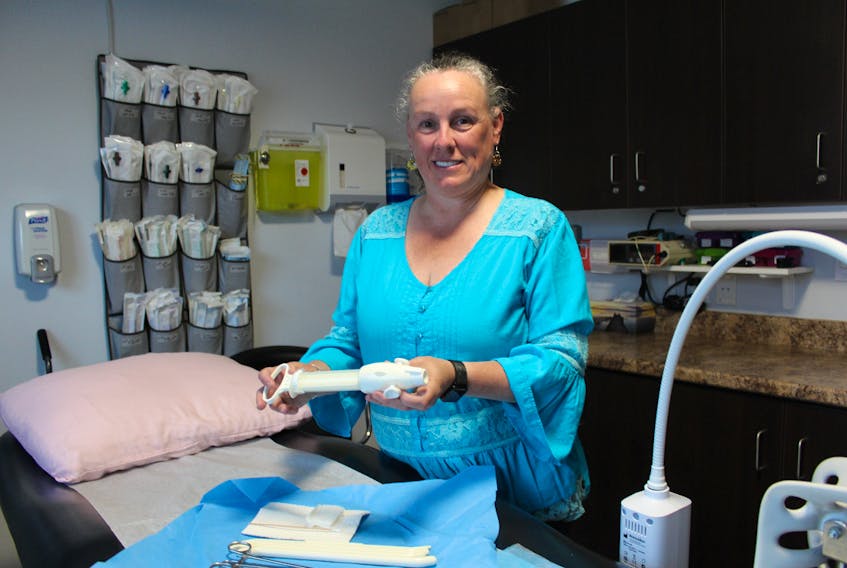ST. JOHN'S, N.L. — Most people seeking an abortion in Newfoundland and Labrador are between age 20 and 34.
Many of them weren’t born when the Morgentaler Clinic opened with a flurry of media attention in St. John’s in November 1990.
Noreen Golfman, provost and academic vice-president of Memorial University, was the media director for Dr. Henry Morgentaler when he opened the clinic. A year after it opened, she wrote about the experience for Prochoice News.
“I remember sheer terror,” she wrote.

“The circle tightened around us. Middle-aged silver-haired men, eyeballs popping, flushed white faces, screaming madly and wildly at Henry: ‘Murderer! Killer!’ and most ironically of all, ‘Nazi!’ The police were nowhere in sight – only an increasingly angry crowd pressed in on us, aiming finally and violently for Henry. Fists started punching towards us.”
For her role in helping people in the province have access to safe abortions, Golfman received death threats and needed police protection even after the clinic opened.
A lot has changed in 29 years, but stigma surrounding the legal health care service remains.
“There are a lot of national conversations happening right now – I’m part of some of them – that are really quite concerned about an emergence of the resistance to and maybe even the recriminalizing of that public access right. So, it would be a mistake to take any of it for granted,” Golfman told The Telegram.
That’s largely why Persistence Theatre Company decided to produce Jane Cawthorne’s “The Abortion Monologues,” a play in the style of “The Vagina Monologues” in which 23 local female performers read a monologue.
Cawthorne interviewed women across Canada before writing the monologues, encapsulating the diverse stories of their abortions.
In 2018, 1,026 people in Newfoundland and Labrador had an abortion.
Almost 90 per cent of those abortions were performed at Athena Health Centre.
Owner and registered nurse Rolanda Ryan said “The Abortion Monologues” truly reflects what she sees at the Centre.
She said the reasons people have abortions are as diverse as the people themselves.
“Most times it’s, ‘I just can’t afford it,’ or, ‘I can’t afford another kid.’
“Sometimes it’s, ‘I had an affair.’ Sometimes it’s, ‘I don’t actually know who the father is.’ Sometimes it’s, ‘My boyfriend is in jail and he’s about to get out and I can’t be pregnant when he’s getting out.’
“And sometimes it’s, ‘I honestly don’t know how this happened. I don’t remember having sex with anybody.’
“And sometimes, it is things like, ‘I was raped.’
“And sometimes, it’s just funny stuff. You know, some people will tell you the story about how they actually got pregnant – ‘Well, we were doing this, and this, and this, and then we did this – and then I realized the condom was gone’ – and how they got to the point where the condom was gone can be really funny.”
More than half of Athena Health Centre’s clients last year already had one or more children, and 80 per cent of abortions performed there last year were nine weeks gestation or fewer.
Ryan said the vast majority of people she has seen at the clinic used some form of birth control when they got pregnant.
“We’ve seen them come in who have IUDs in place, we’ve seen them with their tubes tied, we’ve seen them with husband’s who’ve had vasectomies. We’ve seen a person who had those coils in and had done all the follow-up where you put in a coil and you make sure the fallopian tube is all scarred up and it’s impossible to get pregnant – until they’re pregnant.” -Rolanda Ryan
A long journey
Most of those scenarios would not have held up as legal reasons to access an abortion before 1988.
Ryan, 52, said if she had become pregnant as a teenager, she would have had to sit before a panel of doctors at a hospital to see if she qualified for an abortion.
“You often had to make a case. So, in some cases, it came down to storytelling. So, the best storytellers could get their abortion because they could plead their case better, but somebody who couldn’t articulate their case well, or who had supports, oftentimes got denied.
“I’ve met women who were denied their abortion care. And it’s not that they didn’t go on to have children that they loved, it’s that they still carry that, and they still feel like it changed their lives. I mean, they do love their children that they had, but it was very traumatic to be denied an abortion when you really, really felt that that’s what you needed.”
Ryan said the Morgentaler Clinic made things easier for those seeking an abortion, but they still had to pay for the abortion up until 1998, when it became government funded.
Even then, people walking into the clinic had to face protesters. In 2016, anti-abortion protests were banned within a 40-metre radius of the Athena Health Centre.
History of abortion access in N.L.:
1969: Abortion legalized in Canada only in situations where the pregnancy endangers the person’s life or health
1988: Supreme Court of Canada rules in R. v. Morgentaler to decriminalize abortion and holds that women have Charter rights in the abortion context
1990: The first abortion clinic opens in St. John’s
1998: Government funding means pregnant people no longer have to pay for abortions
2015: Hospitals (but not clinics) permitted to bill other provinces for abortion care for people covered by another provincial health card
2016: Anti-abortion protests banned within 40-metre radius of Athena Health Centre in St. John’s
2017: Athena Health Centre provides monthly abortion services in Corner Brook and Central Newfoundland
Abortion access today
Like many other aspects of health care in the province, people seeking an abortion usually have to travel to St. John’s, except during the once-monthly clinics offered in Corner Brook and central Newfoundland by the Athena Health Centre.
Up to nine weeks gestation, pregnant people can take the abortion pill mifegymiso, which can be prescribed by any physician, though Ryan said not all physicians are comfortable prescribing the medication.
The gestational cut-off to access an abortion in this province is 15 weeks. After that, abortions are performed in other parts of Canada up to 23.5 weeks.
Ryan said one of the big barriers she sees today is for international students because they only have MCP coverage while they are a student.
“We recently dealt with a person who is a student right up to April, and then becomes a student in September, but in the middle of summer has no health coverage at all.
“This person lives here, works here, pays taxes here, and has absolutely no health coverage because they’re not a student during those few months. So, either they pay for their abortion care – they can’t really afford to wait and not do anything, because doing nothing means by the time they get their MCP reinstated they’re too far to get care in this province.”
Access to safe abortions is a concern globally for the United Nations, which says that every year about 47,000 women die and another five million suffer a temporary or permanent disability because of unsafe abortions.
“There’s no such thing as no abortion,” said Ryan.
“It’s either safe abortion, or unsafe abortion. And given the choice between those two, we are so much better off having safe abortion.” -Rolanda Ryan
Persistence Theatre artistic director Jenn Deon calls it “the last taboo of feminism.”
“Nowadays, thanks to “The Vagina Monologues,” we can talk about our vaginas, we can talk about everything under the sun, but when it comes to abortion, it’s still like you kind of need to do a shoulder check if you want to mention it in public.
“So many women don’t feel open to share their experiences even with their nearest and dearest because of the stigma and the judgment that’s been placed on this over the years. And it’s been legal for 30 years, but it’s still such a ‘thing.’
“So, for us to take ('The Abortion Monologues') on … my hope is that we can make the word ‘abortion’ one that you can say without shame, without worry of judgment.”
“The Abortion Monologues” is onstage at The S.P.A.C.E. Aug. 13-14.
[email protected]
Twitter: @juanitamercer_









